
WikiLeak's rise to prominence as the world's first stateless media organization has carried it into the center of a massive storm of controversy. On one hand WikiLeaks and Julian Assange have widespread global support and have won numerous journalism awards. On the other hand, the US government portrayed them as a criminal entity, as a sort of spy organization and certainly not a member of the press protected by the First Amendment. Some top US officials called Assange a high-tech terrorist and should be prosecuted under the Espionage Act of 1917.
With inflamed rhetoric, many in the mainstream media have negatively framed the narrative of this new journalistic force and tried to distance themselves from it. By doing so, they attempted to deflect perception of WikiLeaks from the appearance of legitimacy associated with the word 'journalism'. One tactic was sensational personal attacks, with classic tabloid character assassination of Assange to distract the public from asking questions about the real actions of WikiLeaks. The other was sophisticated intellectual persuasion, where the corporate media criticized the organization, particularly questioning its journalistic status.
![]()
Tennessee is planning a 'Day of Rage' at the state capitol on Tuesday, August 2 at 9:00 am, 600 Charlotte Avenue, Nashville, Tennessee.. WL Central writer, Alexa O'Brien, spoke with the organizer of the Tennessee Day of Rage, Lara Jennings, on August 1, 2011 as Jennings prepares for the protest tomorrow.
Important Information:
1. ] Whatever his revolutionary pretensions were in the past, in the last eight years Mummar Qaddafi has become a compliant, if somewhat unorthodox, third world ruler in the world imperialist system. The changes in the stance of his regime since 2004 are unmistakable. His rapprochement with the EU and even the US after Bush sent Biden to Tripoli on Air Force Two has been well documented elsewhere, as has been his association with Richard Perle and Goldman Sachs. He has joined the IMF, allowed western oil companies to directly exploit Libyan fields and privatized hundreds of key public enterprises. In spite of all the drama of the past, it should be clear to all that the Mummar Qaddafi of 2011 is one that has made his peace with the imperialists and they with him. Contrary to what the Qaddafi supporters would have you believe, there has not been a continuous momentum for imperialist regime change in Libya for the past 40 years.
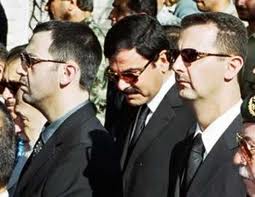 Bashar al-Assad (right) with his brother Maher al-Assad (left) and brother-in-law Assef Shawkat (center) in 2000.
Bashar al-Assad (right) with his brother Maher al-Assad (left) and brother-in-law Assef Shawkat (center) in 2000.
Update:Syrian state TV has aired footage of masked gunmen firing on protesters and police. There are many similar videos in different situations on the internet, and different ideas of who the snipers are, Syrian security forces, protesters, or outside forces.
Today protesters in Dara'a destroyed a statue of president Bashar al-Assad's older brother Basil al-Assad and reportedly burnt down the State TV building in Dara'a and set fire to a Baath Party outpost. Al Jazeera's correspondent Cal Perry reports that the army has now been deployed in large numbers to Dara'a. The government's earlier decision to arm the police force with electric batons instead of live ammunition was reversed today.
Syrian state TV (translated by Al Jazeera) said repeatedly today: Over the past Fridays there were a lot of demonstrations in which armed groups used weapons to kill people and security forces - and though we understand that protesting is a right of the population, we can no longer allow chaos to take place and official buildings to be destroyed. So we will use all the means to stop the chaos from taking place.
Protesters are calling for people to come out tonight in great numbers in other cities to take the pressure off of Dara'a.
Video of snipers from AP
 Photo by Ai Weiwei
Photo by Ai Weiwei
Renowned Chinese artist Ai Weiwei was detained on April 3 at Beijing Capital Airport by customs police while trying to travel to Hong Kong following three police visits to his studio last week. Now there are reports from police authorities late Wednesday that they are investigating Ai Weiwei "for suspected economic crimes in accordance with the law." Following the arrest, police searched his studio and his wife’s home and arrested his wife, his friend and former journalist Wen Tao, and eight of his employees, freeing his wife and the employees within 24 hours. They also confiscated more than 30 computers and hard drives as well as other documents.
The Communist Party's Global Times has spoken out against the reaction to Ai's detention in western countries (the first actual acknowledgement of his detention from Chinese media). In addition, they offer this explanation for his detention: Ai Weiwei is an activist. As a maverick of Chinese society, he likes "surprising speech" and "surprising behavior." He also likes to do something ambiguous in law. On April 1, he went to Taiwan via Hong Kong. But it was reported his departure procedures were incomplete.
Ai Weiwei likes to do something "others dare not do." He has been close to the red line of Chinese law. Objectively speaking, Chinese society does not have much experience in dealing with such persons. However, as long as Ai Weiwei continuously marches forward, he will inevitably touch the red line one day.
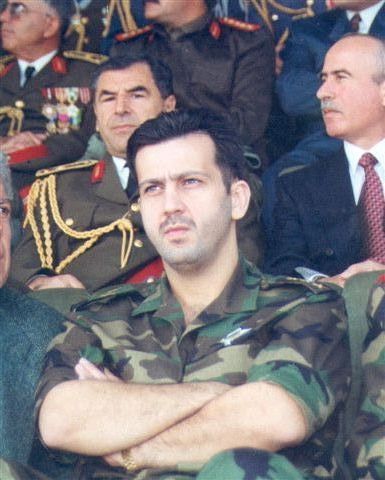 Reuters reports that Syria will set up an investigation into the protest deaths, as well as form a committee to "solve the problem of the 1962 census" during which 150,000 Syrian Kurds were denied nationality. It is doubtful that an investigation will be regarded as hopeful by protesters who blame the violence on Maher al-Assad, brother of the Syrian president, one of his closest advisors and head of the Republican Guard.
Reuters reports that Syria will set up an investigation into the protest deaths, as well as form a committee to "solve the problem of the 1962 census" during which 150,000 Syrian Kurds were denied nationality. It is doubtful that an investigation will be regarded as hopeful by protesters who blame the violence on Maher al-Assad, brother of the Syrian president, one of his closest advisors and head of the Republican Guard.
While Bashar al-Assad is the public face of Syrian governance, his brother is in charge of the security forces that provide Syria with one of the worst human rights and press freedoms records in the world. One of the many things he is commonly
Continuing his customary practice of promises unfulfilled, Syrian president Bashar al-Assad delivered a speech today that was expected days ago and delivered none of the hoped for concessions to protesters. The speech is here, English transcript is here.
Reports online are that after the speech a peaceful protest in Latakia was fired upon. A general commanded that the protesters be shot at. The army would not leave the civilians, they dragged away the bodies of the killed. I saw with my own eyes the bullet shells, I took and kept two in my bag as evidence. They said the security forces shot with automatic weapons. They said the bullets and weapons were Kalashnikovs. Very graphic video reportedly of today's violence has been posted here. An Al Jazeera report from Syria paints a chilling prelude scene before their reporter was turned away. The reporter found a colonel looking down a long range rifle scope at a checkpoint set up with a view of the future protest scene, while everyone was still listening to Assad's speech and the street was empty.
A list is being maintained of people imprisoned, missing and killed since the protests began. This very valuable work shows the name, date, occasionally picture, age, location, circumstance and source for each incident. The total number on the list is now at 275.
After Assad's speech, Syrian state TV showed footage of Assad in Damascus, the site of yesterday's hugely supportive rallies for him, only this time his army of security appeared breached by a rush from the crowd before the TV cut away. Report from News Tsar below.
There are many online reports again that say Syrian president Bashar al-Assad will address the country tomorrow, and that he will make an announcement "that will please the Syrian people". In the meantime, he has accepted the resignation of the Syrian government, the latest in a series of reforms this week which do not include the protesters' demands of an end to the 48 year old emergency law, a drastic reduction of domestic security powers, freedom for all political prisoners and a disclosure of the fate of tens of thousands of protesters who disappeared in the 1980's. The Syrian government do not possess much power, most still resides with Assad, his family, and the vicious and powerful security forces. The resigning premier has been appointed by Assad as caretaker prime minister and a new government is expected to be appointed by Assad within 24 hours.
Daraa and Lattakia are still having huge protests against the government, while in Damascus Al Jazeera is showing large crowds (variously described in the same article and embedded video as thousands, tens of thousands, hundreds of thousands and "perhaps even millions") waving flags and posters in support of Assad. As reported by France24, schoolchildren and government workers were given time off to attend the pro Assad rally. Russia Today has a good video which shows first the huge pro-Assad rally in Damascus which all the major news media not yet evicted from the country were brought to watch, and second the very different and violent protests happening in other regions.
The Libyan foreign intervention will pass from the US led force to NATO command, led by Canadian General Charles Bouchard, with the transition completing "within 48 hours".
The anti-Gaddafi forces are once more moving west at a rapid pace, currently claiming to control Sirte, the home of Muammar Gaddafi. Shamsi Abdul Molah, a spokesman for the opposition's National Council, told Al Jazeera that opposition forces had moved into the city at approximately 11.30pm Sunday night. Now AFP is reporting nine powerful explosions heard in Sirte.
Al Jazeera has reported that anti Gaddafi forces are now in control of Bin Jawad, Ras Lanuf, Uqayla, Brega and Ajdabiya, and they say Gaddafi forces are retreating and surrendering each town without a fight. Anti-Gaddafi forces expect a major battle in Tripoli, where Muammar Gaddafi was reported to be Sunday night, since they did not meet with one in Sirte. Fighting broke out again in Misurata, which has been heavily attacked from the air by French and British forces. Air strikes were also reported on Tripoli, Tarhunah, Sabha and Sirte.
President Bashar al-Assad deployed the army in Latakia today. Until now secret police and special forces have been primarily responsible for quelling the protests this week and killing a large number of protesters, at least 61 according to Human Rights Watch. Exact numbers have been difficult to obtain because of the news blackout imposed in the country, but SANA is reporting 12 killed yesterday in Latakia. Unofficial reports are much higher, but the international news media is being prevented from reporting.
Reuters is reporting two television journalists missing in Syria since Saturday, after "On Friday, Syrian authorities withdrew the accreditation of Reuters text correspondent Khaled Yacoub Oweis, saying he had filed "unprofessional and false" coverage of events in Syria." Al Jazeera had their Sana'a bureau raided on March 22 after an earlier expulsion of two Al-Jazeera correspondents and six other international journalists.
Relative calm is being reported today despite a sit in at the Omari Mosque in Deraa where at least six people were killed on the 23rd. Government officials announced Assad was to make a televised address today, but he has not appeared.
The government of Jordan has announced it will "protect freedom of expression as long as it is carried out with responsibility and respect of the law." as opposition parties, reformists and the March 24 Youth Movement (formerly the Jordanian Youth Movement) called for the resignation of the government, the dissolution of the Lower House and the leadership of the security forces after yesterday's protests (below).
“Freedom of expression is a right guaranteed by the Constitution for all citizens and the government and security agencies have been acting accordingly for the past 12 months,” Deputy Prime Minister and Minister of Interior Saad Hayel Srour said yesterday at a press conference. Srour reiterated that the violent clashes that erupted between a pro-government group and protesters was a “black mark” in the country’s freedom record. However, he stressed, “it will not stop the government from carrying on with its reform efforts and protecting public freedoms”.
The minister announced an investigation has been launched and 21 people arrested following yesterday's violence which saw more than 150 - 160 people injured and one killed in protests. The minister today called for issues to be solved at the negotiating table, not in the streets and government officials at the press conference put the blame for the violence on the protesters. They announced the police had no intention of removing the protester tents set up.
 WL Central will be updating news on Libya, with new items added at the top. You can contact me on twitter @GeorgieBC or by email at admin@wlcentral.org.
WL Central will be updating news on Libya, with new items added at the top. You can contact me on twitter @GeorgieBC or by email at admin@wlcentral.org.
Current time and date in Tripoli:
MONDAY, March 21
The US stated that Muammar Gaddafi was "not a target" as CNN reports that coalition forces have bombed Gaddafi's compound.
Admiral Mike Mullen, the chairman of the US joint chiefs of staff, denied that any civilians had been killed during the launching of 110 missiles and the bombing of 20 targets.
Arab League chief Amr Moussa on Sunday condemned the "bombardment of civilians" and called for an emergency meeting of the group of 22 states to discuss Libya. He requested a report into the bombardment, which he said had "led to the deaths and injuries of many Libyan civilians. What is happening in Libya differs from the aim of imposing a no-fly zone, and what we want is the protection of civilians and not the bombardment of more civilians," Egypt's state news agency quoted Moussa as saying.
Edward Djerejian, a former US assistant secretary of state and former US ambassador to Syria, said it had been made very clear that a no-fly zone could not be established without taking military action against airfields and anti-aircraft installations. "A no-fly zone is not just a computer model game," he told Al Jazeera. "It means military action and that was clear to all parties, including the Arab League."
The Libyan military announced its second ceasefire since the UN resolution authorising the no-fly zone was passed. But the White House has said it will not recognise a ceasefire declaration.
US president Obama is working to "try to shore up support within the Arab world for the military mission in Libya."
The Mail Online reports:
If you got here from an old link, please visit our new campaigns and petitions page, or the master list.
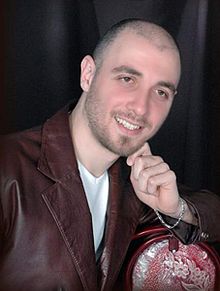 NOMINATE MOHAMMED NABBOUS FOR 2011 CNN HERO
NOMINATE MOHAMMED NABBOUS FOR 2011 CNN HERO
Mo Nabbous is thought by many to be the most inspiring journalist we have seen in a very long time. We feel that he ought to be a CNN 2011 hero. Please go here to nominate him.
Everyday People Changing the World
From Wikipedia: NPR social media strategist Andy Carvin called Nabbous "the face of Libyan citizen journalism;" Nabbous was the primary contact of many international media outlets looking for information regarding the situation in Libya.[citation needed] Nabbous was also the founder of the independent internet tv station in Libya: Libya Alhurra TV, broadcasting on Livestream.com.
Nabbous' online news station, Libya Alhurra TV, was the only broadcast coming out of Benghazi when Muammar Gaddafi shut down internet lines when the February 2011 uprising began.[4] Using an illegal satellite connection, Nabbous was able to bypass government blocks on internet in order to broadcast live images from Benghazi across the world. As the independent voice for a Libyan population during the 2011 Libyan uprising, Der Spiegel reporter Clemens Höges called Nabbous "the man who just might be the most important person in the revolution."
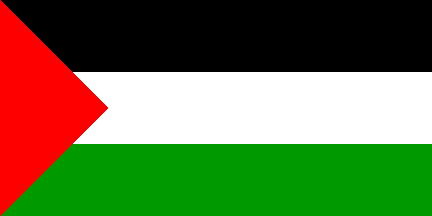 WL Central will be updating news on Palestine, with new items added at the top. You can contact me on twitter @GeorgieBC or by email at admin@wlcentral.org.
WL Central will be updating news on Palestine, with new items added at the top. You can contact me on twitter @GeorgieBC or by email at admin@wlcentral.org.
Current time and date in Gaza:
WEDNESDAY, March 16
Demands from protesters in Manara square:
There have been many Twitter reports, both today and yesterday, of threatening texts from unknown numbers sent to all Gaza phone numbers and warning them to not attend protests or they would be killed.
Yesterday WL Central reported what seemed to be conflicting reports of assaults by Fateh officers and Fateh officers offering food to the protesters. The offers of food are being interpreted as an attack on the hunger strikers resolve and chants today include "No falafel! No cola!" President Abbas sent four jeeps full of food today, to divided reception.
Police are assisting in keeping the Fateh and March 15 groups from attacking each other in Bethlehem and broke up multiple fights today. According to Ma'an News reports, the Fateh group seems torn between disrupting or joining the protests.
From @PalYouthVoice:
"#March15Ramallah hunger strikers are up to 25 now, spirits are high and we're determined to go all the way to the end"
"things are back to normal, Fateh members helped to contain the thugs that attacked us"
As protesters attempted to gather on March, 16 morning in Al Kateeba sq, dozens of thugs (with sticks and clubs) cracked down on the crowd chanting for unity and raising the Palestinian flag to disperse them.
At least 10 students were taken to the hospital today and around 20 were arrested after Hamas plain clothes police and security forces arrived at Al Azhar university and beat up students and blocked anyone from entering or leaving the grounds. Many of the students were planning on attending today's unity rallies. A spokesman for the Hamas-run interior ministry denied that police had entered the university. "What happened at the university was a problem between students," Ihab al-Ghussein told AFP.
 Syria's day of rage was originally scheduled for February 5, but no protesters showed up. On February 15, we reported the arrest of a teen blogger and speculated that the patience of the Syrian people which president Bashar al-Assad was assured would protect his country from protests may soon wear thin. On February 18, we asked, Did Syria run out of patience? as a protest broke out over the beating of a man by police. Since then it has become clear that Syrians have reached a slow boil. This time, on the announced protest day of March 15, Syria was unmistakeably in the streets of Damascus and Aleppo. The facebook page has announced another protest tomorrow, beginning at 12 noon, in all Syrian cities. Reuters announced 40 protesters, but the videos below show far more.
Syria's day of rage was originally scheduled for February 5, but no protesters showed up. On February 15, we reported the arrest of a teen blogger and speculated that the patience of the Syrian people which president Bashar al-Assad was assured would protect his country from protests may soon wear thin. On February 18, we asked, Did Syria run out of patience? as a protest broke out over the beating of a man by police. Since then it has become clear that Syrians have reached a slow boil. This time, on the announced protest day of March 15, Syria was unmistakeably in the streets of Damascus and Aleppo. The facebook page has announced another protest tomorrow, beginning at 12 noon, in all Syrian cities. Reuters announced 40 protesters, but the videos below show far more.
From our previous coverage there are some reasons why the protests are necessary, for more graphic reasons see the last video below. Approximately 10,000 political prisoners are currently being held in Syrian jails. A national state of emergency has been in effect in Syria continuously since 1963 and it is consistently used to suppress and punish any dissent. According to Amnesty International's report on Syria for 2010, "Critics, human rights defenders, alleged opponents of the government and others were detained, often for prolonged periods; some were sentenced to prison terms after unfair trials. Torture and other ill-treatment remained common, and were committed with impunity; there were several suspicious deaths in custody. The government failed to clarify the circumstances in which [17 prisoners and five others] were killed at Sednaya Military Prison in 2008 and, again, took no steps to account for thousands of victims of enforced disappearances in previous years. Women faced legal and other discrimination and violence. The Kurdish minority remained subject to discrimination, and thousands of Syrian Kurds were effectively stateless. At least eight prisoners were executed."
WL Central continues its updates on Yemen, with new items added at the top. All times are based off of Sanaa time in Yemen. You can contact me on Twitter @kgosztola or by email at kgosztola@hotmail.com.
Current time and date in Sanaa:
Tuesday, March 15
 9:22 PM Journalist Iona Craig files this firsthand report on covering the uprising in Yemen Craig’s report details the worsening conditions for not just the people of Yemen but also journalists:
9:22 PM Journalist Iona Craig files this firsthand report on covering the uprising in Yemen Craig’s report details the worsening conditions for not just the people of Yemen but also journalists:
I crept home to my bed, exhausted after two busy days of covering the sudden upsurge of violence in the capital. Unlike the previous two mornings my wake up call was not an early morning text message telling of gunfire, attacks or impending violence from activists at the university encampment, now the centre stage of the anti-government protests, but this time came from friend and fellow journalist Laura Kasinof.
Armed police had raided the house I’d left just a few hours earlier, arresting four journalist friends. During the next few frantic calls to contacts with friends in high places their location remained a mystery. The political security and police denied they had them and still hours later the British embassy had no idea where they were being held. Then reports came through that they were at the Immigration Authority, but would be released and given a few days to sort out their paper work. Moments later these hopes were dashed when they were spotted at the airport.
The journalists deported were: “Oliver Holmes (Wall Street Journal, Time) Portia Walker (Daily Telegraph, Washington Post) Haley Sweetland Edwards who had returned to Yemen for a few weeks, (Los Angeles Times, Atlantic) and Joshua Maricich, a climbing enthusiast, photographer and researcher who had recently written a government supported book on Yemen.”
 Demonstrators in downtown Khartoum's Abu Janzeer square were beaten with sticks and truncheons as they protested today for the end of President Omar al-Bashir’s 21-year rule. Reportedly five hundred riot police arrested over 50 protesters today, and beat up others. As WL Central reported, Sudan began protesting for regime change on January 30 and were met with a violent crackdown which resulted in one student dead on the first day. According to Human Rights Watch the students and youth, some as young as 18, were subjected to harsh beatings, electric shocks, and other abuses that amount to torture. Security officials are also implicated in the rape of a female youth activist in February.
Demonstrators in downtown Khartoum's Abu Janzeer square were beaten with sticks and truncheons as they protested today for the end of President Omar al-Bashir’s 21-year rule. Reportedly five hundred riot police arrested over 50 protesters today, and beat up others. As WL Central reported, Sudan began protesting for regime change on January 30 and were met with a violent crackdown which resulted in one student dead on the first day. According to Human Rights Watch the students and youth, some as young as 18, were subjected to harsh beatings, electric shocks, and other abuses that amount to torture. Security officials are also implicated in the rape of a female youth activist in February.
Yesterday, police arrested and beat over 40 women after they attempted to stage a protest in Khartoum’s twin city of Omdurman demanding the authorities cease "violence against women," and protesting the rape and beating of Saffiya Ishaq, who was attacked after the January 30 protests. Ishaq told her story in a video posted to Youtube on February 23, please watch.

Stories of what happened as Egyptian women protested in Tahrir Square and called for equality and fairness in Egyptian society in honor of International Women’s Day are circulating. Female Egyptians hoped to have a million women march. Unfortunately, only a few hundred women came out to demonstrate and the action turned violent as men disrupted what should have been a peaceful day of celebration.
Christian Science Monitor reports men showed up and shouted, “Go wash clothes!” And said, “You are not married; go find a husband,” and “This is against Islam!” Men suggested women already have enough rights. They argued now was not the time to argue for rights.
Men decided women had been demonstrating for too long and violently scattered the women provoking the military to fire shots in the air. Sexual harassment, which many female Egyptians said during the uprising had disappeared, happened during the “melee.”
Cairo-based reporter and writer Ursula Lindsey reports one “48 year-old accountant” was "horrified by the protesters’ demand that women be allowed to run for the presidency.” He suggested Egyptians would “reject this completely” and added, “Women have a role, and men have a role. We’re used to men ruling. Who rules in my house? My father. And who rules in my family? I do.”
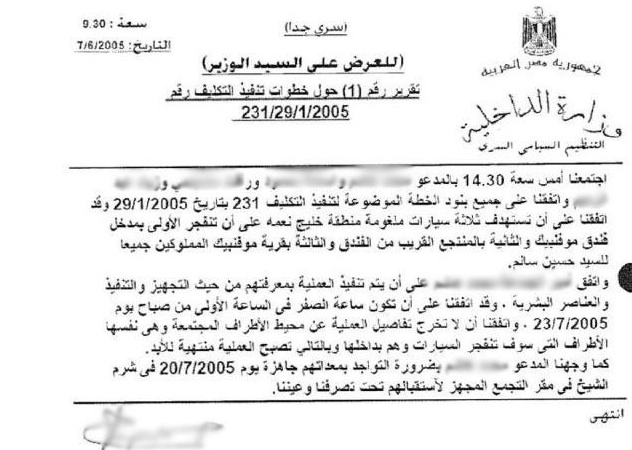 Egyptians stormed Amn Dawla, a State Security building in Nasr City, over the weekend. Protesters were aware that security was burning, shredding and destroying documents that might incriminate State Security officials in any future investigations or pursuits of accountability in the aftermath of the toppling of President Hosni Mubarak. They entered the building, started taking photos and video and took some of the documents to scan and post online or hand over to the armed forces so State Security could not be free from justice.
Egyptians stormed Amn Dawla, a State Security building in Nasr City, over the weekend. Protesters were aware that security was burning, shredding and destroying documents that might incriminate State Security officials in any future investigations or pursuits of accountability in the aftermath of the toppling of President Hosni Mubarak. They entered the building, started taking photos and video and took some of the documents to scan and post online or hand over to the armed forces so State Security could not be free from justice.
Inspired by WikiLeaks, Amn Dawla Leaks was instantly born. Twitter and Facebook accounts began to circulate the documents. The information, in Arabic, received many requests for English translation. It became clear there was much world interest and many would want to know what was uncovered.
One main revelation that has come out in the first days involves a bombing that up to this point was believed to have been perpetrated by Bedouins or Islamists. In the resort city of Sharm el-Sheikh on the southern tip of the Sinai Peninsula, about eighty-eight people were killed.
The document describes three car bombs that are to be detonated at the first entrance of the Movenpick Hotel. The second is to be detonated near the hotel and the third is to be detonated at a hotel in the village of Movenpick. All sites of detonation are intended to damage property owned by Hussein Salem. The bombings are planned for Revolution Day, a day that commemorates Gamal Abdel Nasser’s overthrow of King Farouk in 1952.
 A cable from December 2007 features Gaddafi Development Foundation Executive Director Dr. Yusuf Sawani discussing trans-national terrorism threats and security with US diplomats. The director talks about the fact that a million sub-Saharan African guest workers are resident in Libya and says it should be a “cause of concern.” The workers are a concern because Dr. Sawani believes any of those individuals could possibly commit an act of terrorism. In recent days, many of those guest workers have fled, as Libyans have grown suspicious and attacked a number of black Africans due to reports that Leader Muammar Gaddafi hired “black African mercenaries.”
A cable from December 2007 features Gaddafi Development Foundation Executive Director Dr. Yusuf Sawani discussing trans-national terrorism threats and security with US diplomats. The director talks about the fact that a million sub-Saharan African guest workers are resident in Libya and says it should be a “cause of concern.” The workers are a concern because Dr. Sawani believes any of those individuals could possibly commit an act of terrorism. In recent days, many of those guest workers have fled, as Libyans have grown suspicious and attacked a number of black Africans due to reports that Leader Muammar Gaddafi hired “black African mercenaries.”
The latest from the United Nations Office for the Coordination of Humanitarian Affairs (OCHA) indicates 191,000 or more have fled Libya to Egypt, Tunisia and Niger. A previous report estimated around 80,000 Pakistanis, 59,000 Sudanese, 50,000 Bangladeshis, 26,000 Filipinos, 2,000 Nepalese and other African and Asian migrant workers are hosted by the country.
OCHA reports have been tracking the risk of violence migrant workers face. In a March 3 update, OCHA notes, “Sub-Saharan nationals remain at risk of violence from local populations on suspicion of being Government-recruited mercenaries.” A report on March 2 detailed the needs of those fleeing Libya highlights the need for protection. It reads:
Theme by Danetsoft and Danang Probo Sayekti inspired by Maksimer